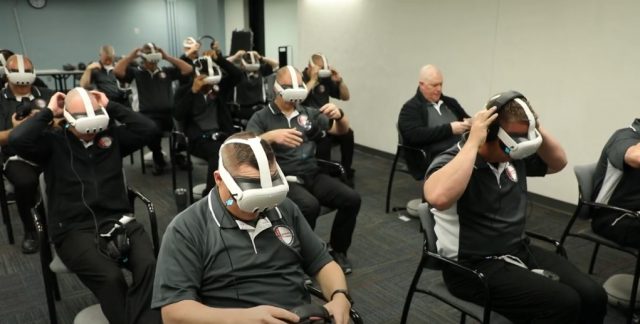
(COLUMBUS, Ohio) — Ohio Attorney General Dave Yost unveiled an innovative approach to law enforcement training with the launch of immersive virtual reality (VR) scenarios designed to enhance the skills of peace officers statewide.
Yost emphasized the significance of embracing cutting-edge technology to empower law enforcement personnel, stating, “These VR goggles provide invaluable training experiences, immersing officers in high-pressure decision-making situations. The beauty of virtual reality lies in its ability to offer realistic scenarios without real-world consequences.”
The VR training modules complement traditional instruction methods, enabling officers to navigate complex and potentially volatile situations using soft skills and crisis management techniques. By simulating real-life trauma, distractions, and reactions, the VR program offers a dynamic learning environment for officers to hone their response strategies.
Currently, the program offers six scenarios, each lasting between eight to 12 minutes, covering critical topics such as mental health crises, domestic violence incidents, school violence, understanding adolescent behavior, suicide prevention, and managing confrontations with irate families. These scenarios can serve as standalone training sessions or be integrated into longer courses.
Accessible to Ohio’s 900 law enforcement agencies through the OPOTA Close to Home program, a collaboration between the Ohio Peace Officer Training Academy and six regional training providers, the VR training initiative ensures widespread access to cost-effective and standardized training resources. Officers can conveniently complete training sessions during their shifts, fostering a shared training foundation across jurisdictions.
“We’re committed to providing consistent training to officers statewide, enhancing public safety on our streets,” Yost affirmed.
The VR scenarios were developed in collaboration with Ohio University’s Scripps College of Communication, McClure School of Emerging Communication Technologies, and Voinovich School of Leadership and Public Service, in partnership with local law enforcement agencies including the Athens Police Department, Ohio University Police Department, and Athens County Sheriff’s Office.
Prior to launch, the VR technology underwent rigorous testing with law enforcement leaders through the John Glenn College of Public Affairs at The Ohio State University. Greg Moody, Director of Professional Development at the college, underscored the importance of innovative training methods in preparing future law enforcement leaders, highlighting the VR simulations’ role in honing officers’ de-escalation techniques and crisis management skills to ensure community safety.











